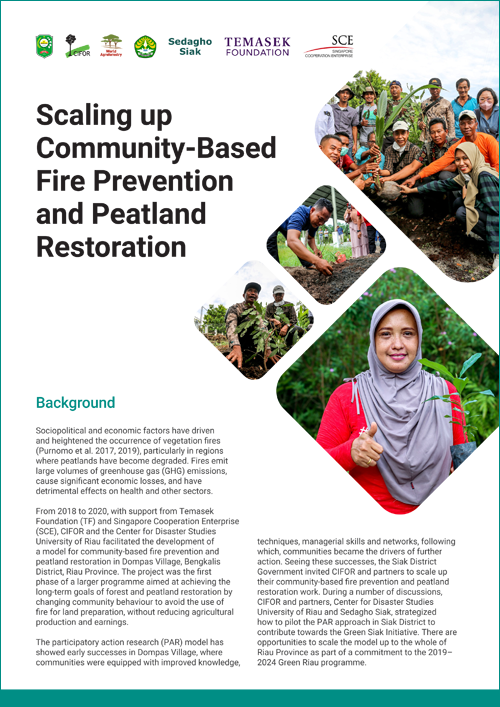In 2015, the forest and land fires in Indonesia were categorized as a national disaster in causing billions in environmental, economic, tourism, and education losses. In 2019, the fires occur again with less extensive. The transboundary haze from fires in Sumatra and Kalimantan affected neighboring countries, including Singapore, and Malaysia and is associated with chronic respiratory disease, which can be further aggravated by the current spread of COVID-19. Despite government “zero burn” programs and campaigns at national and sub-national levels, fires continue to be used because burning is a traditional practice to prepare lands for the new planting season and cheaper for land preparation. A main challenge is to introduce fire-free alternatives to prepare land for agriculture and ways to restore the degraded peatland, in which the fire reoccurring, while acknowledging that local communities lack the resources, knowledge and technology on potential alternatives for farming without burning.
The project field visit and media workshop is an opportunity for partners, journalists, and wider audience to learn about community-based fire prevention and peatland restoration towards FOLU Net Sink 2030 and Post-COVID 19 National Economic Recovery. Jointly organized by the Center for International Forestry Research (CIFOR), Center for Disaster Studies University of Riau (Pusat Studi Bencana Universitas Riau-PSB UNRI), Sedagho Siak and the Green Siak Secretariat, the workshop will highlight the following key questions:
- How can community-based peatland restoration contribute towards Post-COVID 19 National Economic Recovery and FOLU Net Sink 2030?
- Why community matters to achieve the long-term goal of fire prevention and peatland restoration?
- What are the stories and initiatives on the ground related to community-based fire prevention and peatland restoration?
- How can we reconcile/harmonize peatland restoration and sustainable business?
- How can the community-based approach be scaled out and diffused?
Further information:
- Dyah Puspitaloka, d.puspitaloka@cifor-icraf.org
- Budhy Kristanty, b.kristanty@cgiar.org





















